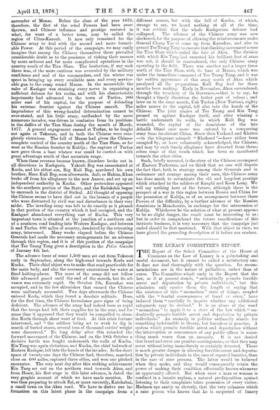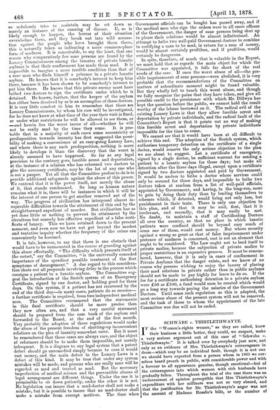THE LUNACY COMMITTEE'S REPORT.
THE Report of the Select Committee of the House of Commons on the Law of Lunacy is a painstaking and useful document, but it cannot be called a satisfactory one. It does not deal thoroughly with the question. Its recom- mendations are in the nature of palliatives, rather than of cures. The Committee admit early in the Report that the law, as it at present stands, "undoubtedly permits forcible arrest and deportation by private individuals," but this admission only carries them the length of saying that the existence of this "anomalous" state of things, coupled with the "fearful consequences of fraud or error," have induced them "carefully to inquire whether any additional safeguards may be devised." It is an abuse of the word " anomalous" to apply it to a state of the law which " un- doubtedly permits forcible arrest and deportation by private individuals." An anomaly in politics ordinarily stands for something indefensible in theory, but harmless in practice. A system which permits forcible arrest and deportation without the intervention or concurrence of any public officer is some- thing much worse than an anomaly. It is not denied that fraud and error are possible contingencies, or that they may occur without being immediately or certainly detected. There is much greater danger in allowing forcible arrest and deporta- tion by private individuals in the case of reputed lunatics, than in the case of sane persons. The latter would be believed when they spoke, and they would consequently retain the power of making their condition effectually known whenever an opportunity offered. But when once a man or woman is confined in a lunatic asylum, a natural predisposition against listening to their complaints takes possession of every visitor. Madmen ape sanity so cleverly, that the very calmness which a sane person who knows that he is suspected of lunacy so sedulously tries to maintain may be set down as merely an instance of the cunning of disease. If, as is likely enough to happen, the horror of their situation overwhelms them, and they break out into wild accusa- tion against the people who have brought them there, this is naturally taken as indicating a more common-place form of madness. It is conceivable, to say the least, that one reason why comparatively few sane persons are found by the Lunacy Commissioners among the inmates of private lunatic asylums is that their confinement has made them mad. It is impossible to imagine a more terrible condition than that of a sane man who finds himself a prisoner in a private lunatic asylum. He knows that it is somebody's interest to keep him there, because it has been shown to be somebody's interest to put him there. He knows that this private enemy must have bribed two doctors to sign the certificate under which he is detained. He knows, further, that the keeper of the asylum has either been deceived by or is an accomplice of these doctors. It is very little comfort to him to remember that there are Lunacy Commissioners, by whom his case will be investigated, for he does not know at what time of the year their visit is fixed, or under what restrictions he will be allowed to see them, or —and herein lies the worst terror of all—whether he will not be really mad by the time they come. It is pro- bable that in a majority of such cases some eccentricity or predisposition towards insanity has first suggested the possi- bility of making a convenience of an easy-going Lunacy Law, and where there is any such predisposition, nothing is more likely to develope it than the discovery that the worst is already assumed to have happened. So far as any legal provision to the contrary goes, forcible arrest and deportation, at the instance of a relation who has suborned two doctors to give the necessary certificate, may be the lot of any one who is not a pauper. Yet all that the Committee profess to do is to provide additional safeguards against the abuse of this power. We contend that it is the power itself, not merely the abuse of it, that stands condemned. So long as human nature remains what it is, there will be instances in which it will be the interest of one person to get another removed out of the way. The progress of civilisation has interposed almost in- superable difficulties towards the attainment of this end by the straightforward expedient of murder. But civilisation has as yet done little or nothing to prevent its attainment by the circuitous but scarcely less effective expedient of a false certi- ficate of lunacy. This we have retained down to the present moment, and even now we have not got beyond the modest and tentative inquiry whether the frequency of the crime can conveniently be lessened.
It is fair, however, to say that there is one obstacle that would have to be surmounted in the course of guarding against this abuse effectually. "The difficulty which presents itself at the outset," say the Committee, "is the universally conceded importance of the speediest possible treatment of the first symptoms of derangement." A due regard to this considera- tion shuts out all proposals involving delay in the process which consigns a patient to a lunatic asylum. The Committee sug- gest the introduction of the Scotch system of an Emergency Certificate, signed by one doctor, and holding good for three days. On this system, if a patient has not recovered by the end of the third day—in many cases, patients do so recover— a further certificate is required, from two independent medical men. The Committee recommend that the statements in this final certificate should be more precise than they now often are, and that a very careful statement should be prepared from the case book of the asylum and forwarded to the Board, at the end of the first month. Very probably the adoption of these regulations would make the abuse of the present freedom of shutting-up inconvenient relations on the plea of insanity somewhat rarer. But it must be remembered that these cases are always rare, and the object of reformers should be to make them impossible, not merely infrequent. It is a disgrace to any legal system that a patent defect should go unremedied simply because to cure it would cost money, and the main defect in the Lunacy Laws is a defect of this kind. It may be true that under any system mistakes will be made, and persons who are really sane will be regarded as mad and treated as mad. But the necessary imperfection of medical science and the preventible abuses of legal arrangement are different things. Under the one it is permissible to sit down patiently, under the other it is not. No legislation can insure that a mad-doctor shall not make a mistake, but it is possible to insure that no mad-doctor shall make a mistake from corrupt motives. The time when Government officials can be bought has passed away, and if the medical men who sign the orders were in all cases officers of the Government, the danger of sane persons being shut up to please their relations would be almost infinitesimal. An attempt to bribe two well-paid Government doctors to combine in certifying a man to be mad, in return for a sum of money, would be almost certainly profitless, and if profitless, would certainly be dangerous.
In spite, therefore, of much that is valuable in the Report, we must hold that as regards the main object for which the Committee was appointed, it falls far short of the real needs of the case. If once the worst abuse of all—the pos- sible imprisonment of sane persons—were abolished, it is very probable that the recommendations of the Committee on matters of subordinate moment might be found valuable. But they wholly fail to touch this worst abuse, and though we fully recognise the pains that they have taken, and give all possible credit to the persistence with which Mr. Dillwyn has kept the question before the public, we cannot hold the result worthy of the labour bestowed on it. The radical evil of the existing Lunacy Laws is that they allow forcible arrest and deportation by private individuals, and the radical fault of the Committee's Report is that it points out no way of making this forcible arrest and deportation by private individuals impossible for the time to come.
We cannot see that it would have been at all difficult to achieve this end. The adoption of the Scotch system, which authorises temporary detention on the certificate of a single doctor, would remove the only serious objection to the plan we are about to suggest. Let a certifica:te of emergency, signed by a single doctor, be sufficient warrant for sending a patient to a lunatic asylum for three days; but make all detention after the three days illegal, except upon a certificate signed by two doctors appointed and paid by Government. It would be useless to bribe a doctor whose services could only be secured for three days, and impossible to bribe two doctors taken at random from a list of well-paid officials, appointed by Government, and having, in the long-run, more to gain by doing their duty than by lending themselves to schemes which, if detected, would bring not only loss, but punishment in their train. There is only one objection to this plan, and of that it may be said, first, that it is irrelevant, and secondly, that it may easily be met. No doubt, to maintain a staff of Certificating Doctors all over the country, so that no place in which lunatic patients were confined should be beyond easy reach of some one of them, would cost money. But where security against a wrong so great as that of false imprisonment under pretence of madness is concerned, cost is not an element that ought to be considered. The Law ought not to lend itself to private malice, because the subjection of private malice to proper restrictions is an expensive process. It must be remem- bered, however, that it is only in cases of confinement in Private Asylums that the danger exists, and we know of no reason why persons wishing to enjoy the luxury of placing their mad relations in private rather than in public asylums should not be made to pay highly for leave to do so. If the fee for a certificate authorising detention in a private asylum were £50 or £100, a fund would soon be created which would go a long way towards paying the salaries of the Government Doctors. Until some such regulation as this is adopted, the most serious abuse of the present system will not be removed, and the task of those to whom the appointment of the late Committee was due will not be ended.



































 Previous page
Previous page